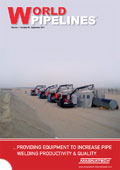Editorial comment
Just like the entire oil and gas industry, the pipeline sector faces good prospects in Brazil, driven by the investments forecast for pre-salt production, as well as for the movement of other feedstock, especially ethanol.
Register for free »
Get started now for absolutely FREE, no credit card required.
Rapid demand growth has made the sector more and more strategically important. In this scenario, quite a few business opportunities are opened up for those companies interested in investing in Brazil; however, we also have to overcome a series of economic, technological and environmental challenges that currently affect the industry in Brazil and overseas.
From an economic point of view, the pipeline sector requires a continued effort to raise competitiveness – and, in such case, the research on new pipeline construction and assembly technologies aiming at reducing the undertakings’ CAPEX becomes extremely important. As regards paying attention to environmental and sustainable development, the constant search for assured integrity of pipeline assets stands out.
The pipeline sector has already promoted several technological breakthroughs, including software for operational simulation and remote sensing to prevent third-party damage, in addition to 3D imaging to determine the best routes for new pipeline projects. As for materials, the growing mechanical resistance of steel has enabled an increase in operational pressure, resulting in a cost reduction for the main pipeline raw material - steel tubes. Pipelines made of API 5L Gr X80 steel are already in use, and the metallurgy sector has been working in conjunction with the pipeline industry to deliver ever more resistant materials. There have also been several breakthroughs in the offshore pipeline construction and assembly field, with significant reduction in the performance schedule of new projects. Onshore, many opportunities are opened up for technological breakthroughs connected to the construction processes.
In the process to obtain new technologies, the main aim is to ensure integrity of the facilities, operational reliability and a ‘zero tolerance’ policy towards leakage. For that reason, a great deal of attention is addressed to the development of leakage detection systems, protection and patrol of the rights-of-way, and the control of corrosion and stability of the banks along the rights-of-way. The concern with environmental and the sustainable development is always present in any pipeline-related strategy.
Another challenge posed by such opportunities, mainly due to the exploration of the pre-salt reserves, regards the demand for specialised labour, which is critical for efficient management and a priority for companies developing business in the country. Brazil has extended the supply and capacity of training programmes and several educational institutions now offer oil and gas qualification programmes in compliance with international standards. We already have a large, experienced labour force working in the sector, but it is necessary to maintain an ongoing effort to prepare new professionals.
Therefore, we now experience an intense agenda in the Brazilian pipeline sector, whose main debate forum will be the Rio Pipeline Conference & Exposition (www.riopipeline.com.br), held for the eighth time by the Brazilian Petroleum, Gas and Biofuels Institute (IBP) in September.
The conference will run a programme divided into 16 relevant topics in the pipeline arena. In addition to the technical sessions, two major panels – one on pre-salt pipeline offloading, with the participation of Petrobras, Technip and BG representatives, and the other on technological trends in the pipeline area, held with the support of the Pipeline Research Council International (PRCI), are expected. Therefore, we will have much opportunity to exchange experiences and knowledge, which will attract the main global players in the pipeline sector. Brazil, as well as the State and City of Rio, has everything to gain.

